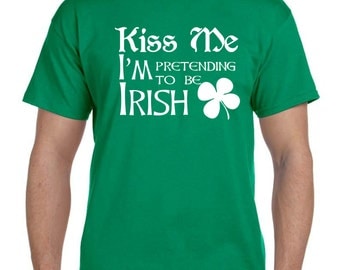Kiss me, (today) I'm Irish! Thoughts on the optional ethnicities of white people
St. Patrick's Day is weird. And I'm not talking about the holiday, what it means or how it is celebrated. I mean the way that white people act on Paddy's Day. It's weird. Suddenly, miraculously, Irish people are popping up out of nowhere, multiplying like rabbits as the day goes on. According to the 2015 Census, 32.7 million Americans claim Irish ancestry, but that is only about 10% of the total population. So why is it that seemingly every white person magically turns into a Irishman on March 17th? I think it has something to
do with symbolic ethnicity.
In our society, a black person can only be "black." They may identify themselves as American, Haitian, South African, German, or any other nationality, but due to the color of their skin, our society labels them as an undifferentiated black person and lumps them into the societal ethnic idea of "blackness." Their race becomes a master status that impedes their interpretation by others or ability to identify as anything else. (A master status means a trait or identifier that has a strong effect on a person's life and dominates other statuses a person has, for example sexuality, race, gender identity, able-bodiedness, and socio-economic status, to name a few.)
White people, on the other hand, hold a lot of power because of their racial master status, and this gives them greater ability to self-identify as something other than "just white." Last semester, I read a piece on whiteness and symbolic ethnicity by Mary Waters from her book "Ethnic Options: Choosing Identities in America." The essential idea was that white people have social freedom to pick and choose their ethnicity and identity based on what suits them at the moment, and that this gives them a sense of uniqueness and claim to a culture. For example, someone may have Armenian, Greek, German, and Italian ancestry, but those identities are not ascribed to them by others; they get to pick and choose. If fact, white people even have the freedom to identify as one thing at one time, then at another say they are something else, and almost no one will question it. Feel closest to your Italian relatives, but think Greek culture is cooler? Say you're Greek! Is Oktoberfest in town? Time to capitalize on how German you are!
Seeing how easy it is for whites to switch up their ethnic identity at will, it should be no surprise that so many people are suddenly Irish on St. Paddy's. I had a friend in high school who, because she had a great-great-grandmother who had Irish ancestry, always wore a "Kiss Me, I'm Irish!" shirt on the holiday, which confused me because I have a great-grandmother who moved to the States from Ireland, but I don't identify as Irish because I wasn't born there or raised with a special awareness of Irish culture or anything like that. Had I worn the same shirt, however, no one would question it, because I am light-skinned with blue eyes. (And especially now that I dye my hair red!) I have the freedom to decide how others view my ethnicity, all because I am white.
Unfortunately, I think a lot of whites don't realize how harmful it can be to appropriate an ethnic background for a holiday like this. I found an article on Vice called "Hey Americans, Please Stop Pretending to be Irish" that sums up why. It explains how baffling it is that of all the traits of being Irish, the U.S. decided to focus on mindless drinking, and how strange it is to Irish people that Americans go so berserk for the holiday and for acting Irish. As the author James Nolan puts it, "it's not just the Irish who are fascinated when you Americans over-identify with your ancestral roots. When you call yourself Italian or German, it baffles Italians and Germans too. Why can't you just identify as American? For a country that waves a lot of flags and considers anything but blind patriotism in politicians an act of treason, the contradiction at the heart of your identity frustrates us."
Ireland is a country with a long history of oppression from the British and the Catholic Church, and this tradition of drinking developed during a time when the typical Irishman was "too poor to eat, too controlled to open up, and too indentured to own land." (Nolan) It wasn't for fun, despite the way that St. Patrick's Day portrays it here in the States, and when white people choose to appropriate pieces of Irish culture in a demeaning, cartoonish way that boils down to green beer and leprechauns, it is hugely disrespectful of Irish culture and invalidates the historical struggles of the Irish nation. So to all white people out there, when St. Patrick's Day rolls around, go ahead and go out for drinks, but don't pretend to be Irish, and leave your cartoon leprechaun and shamrock accouterments at home!
"Kiss Me I'm Pretending to be Irish." Retrieved from
https://img0.etsystatic.com/131/1/12210511/il_340x270.929748620_62pq.jpg
Nolan, James. (2015, May 17). "Hey Americans, Please Stop Pretending to be Irish." Vice. Retrieved from https://www.vice.com/en_us/article/hey-americans-please-stop-pretending-to-be-irish-317
Rosenblum, Karen E. and Toni-Michell C. Travis. (2016). Framework Essay I. The Meaning of Difference: American Constructions of Race and Ethnicity, Sex and Gender, Social Class, Sexuality, and Disability (2-50). (7th ed.). New York: McGraw-Hill Education.
United States Census Bureau. (2017, February 21). "FFF: Irish-American Heritage Month (March) and St. Patrick’s Day (March 17): 2017." Retrieved from https://www.census.gov/newsroom/facts-for-features/2017/cb17-ff05.html
Waters, Mary. (1990). Ethnic Options: Choosing Identities in America. Berkeley: University of California Press.

Comments
Post a Comment